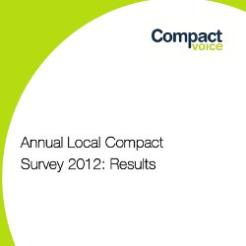Figures from the second annual Compact review show that local authorities are failing to consult the voluntary sector or give appropriate notice of funding changes.
The Compact Voice survey assesses attitudes and compliance of the public and voluntary sector in the implementation of the Compact. The National Compact, which informs all local Compacts, stipulates that a period of at least three months' notice should be given in writing before changes to charities' funding come into force, and that the voluntary sector should be consulted for at least 12 weeks before changes are decided.
However 32 per cent of respondents to the survey advised that three months' notice of changes to funding had occurred only some of the time or never. And a similar percentage advised they were only consulted ahead of any proposed changes some of the time or never.
While Compact Voice noted that guaranteeing a notice period of three months had been difficult due to the late allocation of local funds by central government, it was "dismayed" to see that 32 per cent did not give notice most or all of the time.
"The fact remains that 32 per cent of Compact areas report no or partial compliance to what should be seen as a prerequisite for decisions that affect the VCS," the body advised.
'A level of complacency'
Further compliance issues were raised when respondents were asked if the recommended 12-week consultation period before funding decisions was adhered to. Some 37 per cent of respondents advised that the voluntary sector was consulted ahead of proposed funding changes only some of the time (35 per cent) or never (2 per cent), while 45 per cent said consultations were only sometimes (42 per cent) or never (3 per cent) open for at least 12 weeks.
Compact Voice said that the lack of compliance over consultation was "neither excusable or acceptable" adding: "The fact that this was reported to be the case in 45 per cent of Compact areas suggests a level of complacency that has perhaps been exacerbated by the inconsistent example set by central government."
Compact Voice has worked with central government since the results of last year's survey to encourage take-up and implementation of the Compact. It has had some successes, with the Department for Communities and Local Government introducing the Compact through its Best Value Guidance for decision-making and "most" government departments including their plans for how they will deliver on their commitment to the Compact within their business plans. But a National Audit Office report on the implementation of the Compact by government reported that 40 per cent of all consultations did not meet the 12-week minimum, and 54 per cent of these did not offer an explanation as to why.
Statutory and voluntary sector attitudes polarised
On the key matter of voluntary sector independence opinions were polarised between the voluntary and public sectors. While 37 per cent of voluntary sector respondents believed that respect for their independence had declined, 60 per cent of public sector respondents believed it had improved, with only 10 per cent agreeing it had declined.
The survey also highlighted a widening gap in attitudes in relating to knowledge of the Compact. Some 54.5 per cent of voluntary sector respondents agreed that people within the sector know about their local Compacts, a dip of 4.3 per cent on last year, while conversely 80.6 per cent of statutory respondents agreed with this statement, an increase of almost 9.8 per cent on last year.
This gap was further illustrated when asked the same question in relation to people within the public sector. While 38 per cent of voluntary sector respondents agreed that people within the public sector know about their local Compacts (a dip of 9 per cent on last year), 72 per cent of statutory sector respondents agreed (a rise of 8 per cent on last year).
However there was some cohesion between the two sectors, with the percentage agreeing that the public sector is actively engaged in the Compact decreasing on both counts, by 2 per cent to just 18 per cent by the voluntary sector and 4 per cent to 47 per cent by the public sector.
Support for Compact still high
While there has been a dip of 7 per cent of respondents that agree that 'the Compact is important and effort needs to be made to implement it in full', the proportion that agree remains high at around 82 per cent.
Compact Voice, the national organisation championing the implementation of the Compact, received 354 responses to its annual survey, from both statutory and voluntary sector sources. Responses covered 77 per cent of all local Compacts. The full results can be viewed here.









